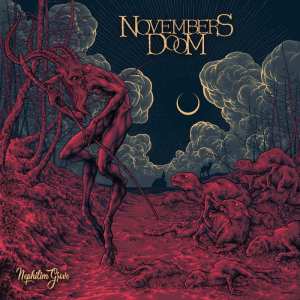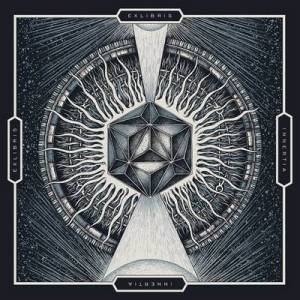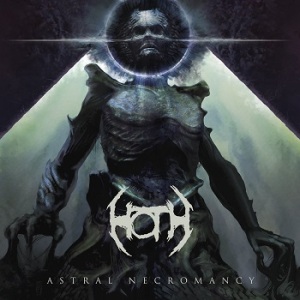Here we are, on the doorstep of Thanksgiving and at the natural end of the 2019 metal release calendar. If you’re releasing your album in December, fire your label because most of us are on the verge of publishing our best of lists for the year and drinking as much Bailey’s as possible. These are my final reviews for the year, for releases that arrived in the autumn months of September through November, and crammed together at that. I know for sure that I’m missing some notable names here, and I simply ran out of time, like actual tangible time to listen to so many records while also giving a massive amount of attention to headline grabbing artists like Blind Guardian and Insomnium (oh and also, you know, real life stuff like work, studying, sleeping, and whatnot). In keeping with the way I’ve handled these bundled up reviews dumps throughout this year, these are smaller reviews, meant for a quicker read than your typical Metal Pigeon deep dive. And while I’m going to write more about this in the upcoming best of features, its worth emphasizing here just how much truly spectacular music we’ve had to come to grips with this year. These past three months have certainly lived up to their predecessors in terms of bringing quality and quantity. And while this blog is calling time on 2019 with this final new music update, on the upcoming MSRcasts we’ll be discussing at length a ton of stuff that I haven’t covered here, particularly albums that we’ve missed from earlier in the year that we’re only now getting around to.
Dawn Of Destiny – The Beast Inside:

It kinda stunned me that its been four years since Dawn of Destiny’s last record, 2015’s eminently listenable To Hell. This four year gap between that record and their newest, The Beast Inside, represents the longest time they’ve gone in between releasing albums (even lapping the three gap between 2009-12 caused by the departure of original vocalist Tanja Maul). I didn’t notice the absence largely in part to just how much new music I have spilling into my lap at any given month in any given year, with seemingly no let up —- a luxury of a problem for sure, but it does tend to cause the kind of inattentiveness to a band’s activities that me fifteen years ago would’ve scoffed at. Five years ago, I placed the band’s 2014 record F.E.A.R. at the number three spot on that year’s best albums list, and its been one of those albums that I’ve revisited so much since then that I can’t help but feel it’s in the conversation for one of my favorite albums of this past decade. That F.E.A.R. and To Hell were merely a year apart hearkened back to the band’s first three albums, also released in rapid succession one year after another —- this was clearly a band that was loaded with creativity, weren’t encumbered by a lengthy touring schedule, and were prepossessed with a desire to release as many albums as possible, and in doing so establish an artistic legacy despite their low profile on the international metal scene. I spell all this out because I’m wondering if that kind of rapid fire release schedule was the secret motor to the band’s artistic success in some forward momentum sustaining kind of way. Because for its strengths, The Beast Inside is a bit of a let down in comparison to its two immediate predecessors. Maybe taking too much time in between releases is the band’s kryptonite.
Given bassist/co-vocalist Jens Faber’s pedigree as a songwriter however, we’re guaranteed a handful of strong moments on this album. First among these is the album opener “The Beast Inside A Beauty”, a constantly shifting, redirecting slice of gothic tinged melodrama built on throbbing basslines, DoD’s always surprisingly crunchy riffs and a powerful vocal performance by Jeanette Scherff. Her staccato delivery, seemingly effortless, deft, and incredibly rich in tone is one of the most addictive aspects to the band’s sound, and she elevates a song like “It’s My Fate”, which is a bit of a left turn from DoD’s gothic power metal pomp with its strange pacing and instrumentation. But surprisingly, the two best songs on the album see Scherff sharing co-lead vocal duties with Faber in dramatic, enchanting duets: “Fight Your Inner Demons” is the kind of dark, moody theatrical power balladry that would’ve felt at home on F.E.A.R.; and “Peace Of Mind” is a branching out into experimental territory that actually works rather well. Faber takes the lead vocal and has improved as a singer, reminding me here of a smoother Alice Cooper on the verses while soaring alongside Scherff in the spectacularly epic chorus. It’s the killer cut on an album otherwise bogged down by a lot of songs that leave me simply wanting to return to their older albums for my fix of high melodrama. There’s nothing here I can point to as glaringly offensive, but I can’t help but wonder if its rust that’s preventing some of these songs from shining the way I’ve grown used to DoD appearing. I’m hoping that the band will be back with something new in their customary quick turnaround fashion and I’ll be heaping praises on them once again.
Kobra And The Lotus – Evolution:

The usage of the term evolution to describe any band’s changing sound from an album to album is one of the more overused in the vocabulary at this point. I think its been invoked so often that we’ve all lost sight of what its meaning is actually supposed to apply to —- gradual change over a lengthy period of time. When you do an about face in your musical approach from fairly serious in tone progressive hard rock/metal to the radio rock driven approach that Kobra and the Lotus have employed on their newest album, you don’t get to simply call it Evolution and not have someone call bs on it. You changed, you made a decision to change, not evolve. This was a late September release, and I heard it for the first time back then on release day, and was so baffled at what I heard that I immediately shelved it and vowed to come back at another time when I was less busy and more mentally prepared to process just what the hell this band had done to their sound. If you’ll recall, I came on board with Prevail I/II, the latter of which found itself popping up on my best songs of 2018 list with the incredible “Let Me Love You”. The refined melodicism of that pair of albums was an exciting place for this band, a merging of old influences and modern production flourishes and metallic crunch, kinda their sweet spot. It was helmed by producer wunderkind Jacob Hansen, who has proved himself to be quite skilled at merging the sometimes disparate worlds of gritty heaviness and refined melodicism into something excitingly whole. Weirdly premonitory, on the topic of the band’s future I spelled out the following —- “…the question is whether that central guitar riff will be too heavy for programmers and leave this song in too commercial for metal / too metal for radio purgatory.” I’m guessing I wasn’t the only one asking that question, whether it was the band themselves or their management, or the terribad advice of industry folks, radio programmers, booking agents and the like.
Whomever is to blame for the nudge, its the band themselves that acted on the advice and cooked up really meaningless pap like “Get the Fuck Out of Here”, which sounds far worse than its title would suggest. And I’ve never been a fan of dropping profanity in lyrics, not because I’m some puritanical church boy who’s easily offended, but because I think its lowest common denominator language that really has no place in a recorded artform where an artist has time to think about what they’re trying to say. I do think there are exceptions to this rule, but they’re few and far between and not reliant on genre either, because I think profanity in hip-hop also works to the same detrimental effect —- can you express an idea in a more intelligent manner? I’m fine with someone using it in everyday speech, in that off handed way that we all engage in here and there, but what am I getting out of it in a song? Onto a less juvenile but no less schlocky cut like “Burn!”, which is the album’s first single and thus a good indicator of the thought process for this album as a whole —- we get a generic riff progression, sterile production with none of the rough edge we were treated to on Prevail, and an electronica wash used by Amaranthe and more nauseatingly, modern In Flames. Production here was handled by the radio rock inclined Michael Baskette, who’s associated with Alter Bridge and Linkin Park, so smooth and polished is the blueprint. There’s a lone call back to the band’s previously gritter approach, the ballad “Wash Away”, and its worth adding to a playlist with the Prevail and High Priestess songs. As for the rest of this… what a disappointment. I noticed the press release for the album bafflingly stated: “No longer bound by old formulas and expectations from the past”, to which I can only wonder who they feel was holding them back. Their fans? The press release also stated “Each song feels like an Active Rock hit in the making”, which I guess kind of says it all really.
Blut Aus Nord – Hallucinogen:

France’s most enigmatic black metal band is back with their most unexpected, and bewildering in a good way album to date. The last we heard from Blut Aus Nord was 2017’s Deus Salutis Meæ, an inscrutably dense affair that largely sounded to me like one long industrial noisescape. It was not what I wanted to hear after being so taken with 2014’s Memoria Vetusta III, a top ten album of the year listee and mid-90s second wave Norwegian black metal revisitation. Well, push both of those aside for Hallucinogen, because Vindsval and company have cooked up something entirely new here, a merging of black metal tremolo riffs with a looser, more rock directed rhythmic structure through which they inject ample amounts of major chord melody. Its not so much Deafheaven’s Sunbather as it is borrowing a little from the progressive rock world of Steven Wilson and Tool, with maybe a splash of fellow countrymen Alcest to help things mesh well. The vocals here are buried deep in the mix, more so than usual with Blut, and so for that reason its hard not to hear Hallucinogen as largely an instrumental and textural affair. That’s not a bad thing, because this is a captivating listen, a record that I always intend to put on as a soundtrack to some other mental activity and wind up paying more attention to regardless. If the cover art wasn’t a big tip off, the music certainly points to a central motif running throughout that’s informing the musical path here, that of a sense of discovery and exploration through the world of psychedelic stimulation. The melodic lead guitar figures on “Sybelius” are a vivid example of what I’m referring to, this isn’t a typical sound palette for a band known for dabbling in extreme black metal and noise. But its not just its burstingly melodic nature that characterizes Hallucinogen, its how emotionally charged that melodicism comes across that has resulted in this being one of the most fascinating albums of the year.
Alcest – Spiritual Instinct:

Alcest have over the past decade plus since their 2007 debut rarely failed to impress me. There was the 2014 misfire with the entirely non-metallic dream pop of Shelter, and thankfully they kept that exploration confined to one album because otherwise we’d have never gotten 2016’s year end list maker masterwork Kodama. Neige said at the time of Kodama’s release that his return to the band’s pioneering black gaze sound on that album was in large part because he wanted their new music to be punchier (something they lost entirely on Shelter). It’s interesting then to see that on its follow up, Spiritual Instinct, he’s doubling down on that desire instead of reactively shifting away from it purely to do something different for the sake of it. I say they’re doubling down on the punchiness factor because this is the heaviest, most aggressive Alcest album to date —- almost as if Neige opened his closet and rediscovered his lost black leather jacket and he and drummer Winterhalter drove around France listening to Accept records one day. Simply put, Neige is laying down some pretty excellent riffs throughout, particularly on the first four songs. On “Les jardins de minuit” at the 5:56 mark, I’m hearing the first full blown headbanging passage in an Alcest record. That happens again with the rumbling rhythmic groove riffing on “Protection”, and the propulsive Tool meets Porcupine Tree fusion on “Sapphire”. I will say that overall, for all it’s fun Neige plays non-tremolo metal riffs glory, Spiritual Instinct can’t quite match the beautiful artistry of Kodama. That album had so much going on within its gorgeous songs, particularly with its infusion of Japanese folk music motifs. Maybe Neige just wanted to get back to basics on this new one, and that’s fair enough, its a solid, at times really impressive record. Just not their greatest.
Wilderun – Veil Of Imagination:

I’m new to Wilderun, but the ceaseless chatter surrounding the Halloween night release of this album in the r/PowerMetal circles motivated me to check the band out. The peeps there listen to all kinds of metal, but general consensus on extreme metal releases are few and far between, so that was enough of a signal that perhaps this Wilderun band was something special. And they’re definitely a unique merger of sounds, that of blistering Blackwater Park era Opeth with Pink Floyd-ian spacey prog passages, cinematic ambient noises, effects, and a general panoramic feel to how this music is presented. And wow, is this definitely an experience that I associate more with something like a film soundtrack rather than a metal record. The opening cut is a fourteen minute plus opus that starts with spoken dialogue and an acoustic, folky guitar intro piece, and is joined by flutes and enchanting choral vocals —- all before the cold water of a shaking tremolo riff pierces the serenity. The metallic attack here can be shocking heavy, but it’s well balanced, with crisp instrument definition in the mix and a pretty sweet drum sound throughout, at the forefront of the recording but never overpowering the rhythm and lead guitars. And don’t get me wrong, I enjoy this album’s metallic nature, but its everything else going on in Wilderun’s musical palette that’s really the draw here. This band is the brainchild of former Immortal Bird guitarist Evan Anderson Berry, and he deserves props not only for being a seriously excellent growler and clean vocalist ala Mikael Akerfeldt, but for his skill at coordinating so many diverse musical elements in a single album (and at times in a single song or even section). Its unfortunate that they released this record so late in the year because myself and others likely didn’t get to have enough time to spend listening to it yet —- I’m on week three and I’m still finding new things on each and every listen. I guess this is more of a recommendation than a review… I’m not at a stage where I can say I’ve fully digested this album and know every nook and cranny by heart and have a firm grasp on its strengths and weaknesses. What I can say is that I never tire of listening to it, and it is certainly one of the most adventurous listening experiences you’ll ever encounter, this year or any year. Check this one out in full, but if you want a bite sized go-to sample, hit up the epic “Far From Where Dreams Unfurl”, which is the song that’s perhaps most representative of the album as a whole, and also a gorgeous, sweepingly grand piece of music.
Cyhra – No Halos In Hell:

You might recall that I was surprisingly impressed with Cyhra’s debut, Letters To Myself, two years ago. That such an unlikely pairing of Jesper Stromblad and ex-Amaranthe clean vocalist Joacim Lundberg actually worked and produced some compellingly emotional modern metal, was a minor triumph. My only real complaints with that record as I recall were that I didn’t care for the abundance of slower, ballady material through the back half of the album, feeling like it dampened the excitement generated by the hook factor of the uptempo tracks. As per Lundberg’s own description of his voice paired with melodeath type guitars (i.e., Bon Jovi meets Soilwork), Cyhra found a realized sound rather quickly on those uber catchy, high energy songs, with Stromblad finding just enough space to weave in some of his unmistakable melodic signature lead bursts that we came to appreciate during his tenure with In Flames. Lundberg for his part proved himself to be quite adept at penning a razor sharp vocal hook, and we were finally able to get some clarity on just how vital a songwriter he was for Amaranthe. I looked forward to a second album, wondering if the band would amp up the heaviness the next time around. What they’d established on Letters was a good baseline, a balance of syrupy pop melodies with the splashy melodic technicality of one of melodeath’s pioneering architects. Yet the question that hung in the air was which way would the band lean further towards on future releases?
It doesn’t take more than one listen of No Halos In Hell to immediately pick up on the fact that the band has stuck with the formula of the first album, down to including way more songs than necessary resulting in a heavily diluted tracklisting. But unevenness in song quality is the least of the problems here, because while their debut had about seven to eight songs that were playlist worthy, repeat listeners —- No Halos has at best three to four, and that’s pushing it. I’m not sure how best to articulate why these songs just seem to fall flat, because the performance quality is up to snuff regarding Lundberg’s vocals and the rest of the band’s musical contributions. Stromblad seems a little more subdued throughout however, and that might be a major contributing factor, his signature guitar stylings not as bright and bursting as they were on the debut. I suspect that Lundberg is trying to branch out in his writing of melodic vocal melodies, and while that’s admirable in a vacuum, its not exactly what Cyhra needed right now. The songs that work here, such as “Battle From Within”, “Hit Me”, I Am The One”, and “Out Of My Life” have quick striking hooks in their refrains that are packed tightly between concise verse passages. But long drawn out soft ballady such as “Lost In Time” just does not work here, and perhaps it would have in an Amaranthe context, with Elize Ryd’s sugary tone carrying some of the lines in a duet. Not even a “full band” version further down the tracklisting can save it, and while you can hear what Lundberg was going for in the chorus, its just too flat of a hook to capture the heartstrings. Its a cliche, but the sophomore slump seems to be very much real here, and its down to the band playing it safe and repeating themselves when they probably should’ve looked to shake things up a little more on this one. My advice, for what its worth (and coming from a fan): Let Jesper cut loose, give him more extended solo sections, limit the slower/softer songs to one or two, and allow your heaviness to directly contrast with those aforementioned smooth Bon Jovi-type vocals. Cyhra’s sound has potential, but they gotta turn the key to unlock it —- otherwise they risk it growing stale really fast.
Novembers Doom – Nephilim Grove:

America’s hardest working doom metal vets are back with a follow up to 2017’s double year end list making Hamartia. That was a special album, the band choosing to explore their more melancholic and expressively emotional side. It reminded me of stuff like Charon, Sentenced, and Katatonia. It met with a surprising amount of vocal resistance from some fans, who felt that the band’s headfirst dive into pure melodicism was not what they signed up for, but a newbie like myself loved it. I’m a little less keen on Nephilim Grove then, in large part to the band’s retreat from the Hamartia approach and abrupt march back towards a more death-doom groove metal vein. Of course the possibility exists that there just wasn’t enough left to mine from that Hamartia style, and to force it for a second album would’ve produced less than inspired results, so I can’t fault the band for that if its the case. The possibility exists that a die-hard November’s Doom fan like my MSRcast co-host Cary will feel differently about this new album, and that I’m the odd man out for this round, which I can live with. And I should say, after having sat with Nephilim Grove for a few weeks, that its a solid slab of speaker rattling metal, more uptempo than the doom tag suggests, with tunes like “Petrichor” and “The Witness Marks” set to uptempo, attacking rhythms. Paul Kuhr of course sounds fantastic, his clean baritone as bleak and discomfiting as ever, and his growls fierce and crisply enunciated. The most satisfying cut here is “Adagio”, and he turns in an awesome performance delivering both vocal styles in direct, quick succession during the chorus. I dunno… if you haven’t listened to this yet but have enjoyed the band before, chances might be high that you’ll be all about this record, I’m very interested to hear Cary’s thoughts on it (we’ll be discussing it on our next podcast). Chalk this up to maybe being a Metal Pigeon problem, not a Novembers Doom one.




 So I spent most of the past month mistakenly thinking that this summer was a little light on quality new music, and to a certain extent that’s right in terms of May and June. Fortunately for me I’ve taken advantage of the lull to do some digging on stuff I might have missed in the past six months in general. I discovered these through a variety of different sources, but mostly from my friends at /r/powermetal and its corresponding Dischord chat as well as the USPM Connection Facebook group, all of whom helped me out with a ton of suggestions for albums I’ve missed (for better and worse). I’ve picked out a handful of the most interesting ones, so I guess these are somewhat reviews but kinda also just straight up recommendations that I think are worth your time. I’ve also reviewed the new Khemmis and Kobra and the Lotus, two bands that I had previously heard of but have never written about or investigated too much until now. The nature of how I came to hear most of these bands is a microcosm of the very essence of this blog’s founding mission, namely being a conduit for word of mouth recommendations, from others to me, and hopefully myself to you.
So I spent most of the past month mistakenly thinking that this summer was a little light on quality new music, and to a certain extent that’s right in terms of May and June. Fortunately for me I’ve taken advantage of the lull to do some digging on stuff I might have missed in the past six months in general. I discovered these through a variety of different sources, but mostly from my friends at /r/powermetal and its corresponding Dischord chat as well as the USPM Connection Facebook group, all of whom helped me out with a ton of suggestions for albums I’ve missed (for better and worse). I’ve picked out a handful of the most interesting ones, so I guess these are somewhat reviews but kinda also just straight up recommendations that I think are worth your time. I’ve also reviewed the new Khemmis and Kobra and the Lotus, two bands that I had previously heard of but have never written about or investigated too much until now. The nature of how I came to hear most of these bands is a microcosm of the very essence of this blog’s founding mission, namely being a conduit for word of mouth recommendations, from others to me, and hopefully myself to you. Exlibris – Innertia:
Exlibris – Innertia: Kobra and the Lotus – Prevail II:
Kobra and the Lotus – Prevail II: Thaurorod – Coast of Gold:
Thaurorod – Coast of Gold: The Night Flight Orchestra – Sometimes The World Ain’t Enough:
The Night Flight Orchestra – Sometimes The World Ain’t Enough: Uada – Cult of a Dying Sun:
Uada – Cult of a Dying Sun: Khemmis – Desolation:
Khemmis – Desolation: Frozen Crown – The Fallen King:
Frozen Crown – The Fallen King: Hoth – Astral Necromancy:
Hoth – Astral Necromancy: